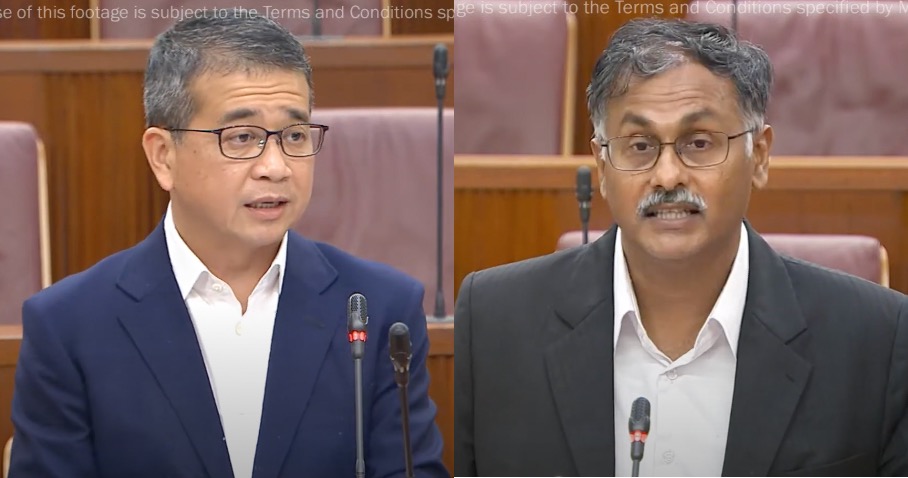The Executive branch - led by the Prime Minister, Cabinet ministers and office-holders - is best placed to make decisions, and act quickly, said Second Minister for Law Edwin Tong.
Tong was speaking on March 4, in reply to Member of Parliament (MP) Murali Pillai, who spoke during an Adjournment Motion after a marathon Committee of Supply debate.
The MP for Bukit Batok SMC suggested that certain laws exempt from review by the courts, which he called "ouster clauses", should be re-examined from time to time.
Tong reassured the MP that the government is already doing this regularly and will continue to review the need for such clauses when necessary.
Ouster clauses
Murali's speech addressed certain Singapore statutes with those limitations, which he called "ouster clauses".
Perhaps the most well-known of these is the Internal Security Act (ISA), which is not subject to judicial review, but does have another checks, such as the involvement of the elected President and an advisory body.
There are also other Acts with similar clauses, such as Charities, Immigration and Employment of Foreign Manpower.
Murali made it clear (several times) that he feels that the ISA is fine as it is. He believes it is an important tool in fighting threats such as terrorism and espionage, and he does not feel it would be appropriate for the courts to have the "final say" on matters of national security.
Time for a review?
But with respect to the other acts, Murali asked if the government could consider a review for the following reasons:
- The initial rationale for ouster clauses in certain Acts may apply in how these Acts are used today.
- The "utility" argument is not a big obstacle because the courts can sanction a party abusing the court process to drag things out.
- A 2019 Supreme Court decision merited further discussion on the issue.
Aside from these technical arguments, Murali also made the general point that Singaporeans desire checks and balances, and allowing the "sunlight of scrutiny" to shine on these laws would strengthen the trust of Singaporeans in the legitimacy of the law.
What is the role of Singapore's judicial branch?
Tong began by pointing out that Singapore's system is based on the separation of powers -- Judicial, Executive and Legislative -- each with its own spheres of responsibilities and powers.
The courts do have latitude in general to review executive action on grounds of illegality, irrationality and procedural impropriety.
But the courts also recognise that the exercise of executive authority is ultimately the responsibility of the Executive branch, and not the courts.
Tong cited examples in other countries such as India, Australia and the UK, where the courts arguably play a more activist role.
In Singapore, it is the Executive branch which has the constitutional authority and the political mandate from having been elected. It is also accountable to Parliament.
Also, Tong said the Executive has the institutional competence and resources to make "judgement calls" between competing considerations that often arise in policy decision.
Tong said he agrees with the approach the courts have taken, which is to avoid stepping into the spheres of the other branches of government.
Executive does not use ouster clauses lightly
Tong then elaborated that the government has taken a "principled and calibrated" approach to the use of ouster clauses.
It considers i) the policy objective behind the proposed clause, ii) whether alternative legislation can be used instead, and iii) whether it can restrict only some of the bases for judicial review.
After that, these ouster clauses are subjected to rigorous parliamentary debate and passed into law only with Parliament's assent, he said.
The ruling People's Action Party (PAP) currently has a substantial majority in Parliament.
Laws mentioned by Murali should still have ouster clauses: Tong
Tong then addressed each of Murali's points.
Like Murali, Tong believes that the ISA is necessary to allow for pre-emptive action to be taken in the name of national security.
However, unlike Murali, Tong feels that other Acts with ouster clauses that are unrelated to national security should still be allowed to exclude or restrict judicial review.
For immigration and foreign manpower, Tong justified the continued use of ouster clauses where necessary, as these are "key areas of concern" which could develop into social schisms.
Also, the courts are not best-placed to have the final say on such matters, with Tong repeating the advantages of the Executive branch to handle such matters instead.
Tong added that Murali asked for a review of ouster clauses, but assured him that this is already being done regularly.
"We will continue to review the need for such clauses and where necessary, carefully calibrate these clauses to the intended policy objectives behind such an ouster."
Tong mentioned that ouster clauses that were deemed no longer necessary have been repealed before, such as the former section 14(5) of the Employment Act.
Success so far
Tong concluded that out of the three branches of government, the Executive is the best placed to make decisions and act quickly, while still remaining accountable to Parliament.
Notwithstanding such ouster statutes, Singapore currently enjoys a high level of trust and confidence.
According to a handout distributed by Tong, 95 per cent of respondents to a Ministry of Law survey agreed that Singapore is governed by the rule of law.
90 per cent had trust and confidence in Singapore's legal system. Internationally, we are ranked third out of 180 countries on the corruption perceptions index (2020) by Transparency International, and first in the world on public sector performance by the World Economic Forum.
Tong said this showed what Singapore has achieved with its political and government system, and that it promotes both good governance and the rule of law.
Top image from MCI's YouTube channel.
If you like what you read, follow us on Facebook, Instagram, Twitter and Telegram to get the latest updates.
